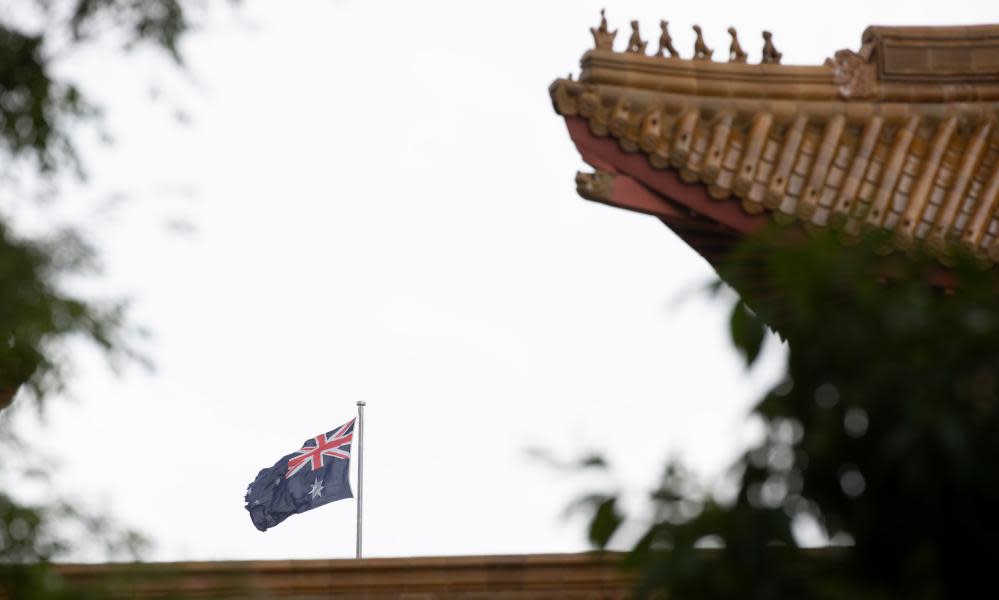NSW and South Australia back foreign interference laws against high court challenge

New South Wales and South Australia have intervened in a high court case in defence of Australia’s foreign interference laws, which are being challenged by a political staffer accused of acting on behalf of China.
John Zhang, who worked for NSW Labor MP Shaoquett Moselmane, is seeking the cancellation of warrants the Australian federal police used to search his property last year, arguing elements of the foreign interference laws are invalid because of their effect on Australia’s implied freedom of political communication.
But the NSW and South Australian governments have made submissions backing the validity of the Malcolm Turnbull-era laws, arguing the rules serve a legitimate purpose and promote transparency in politics.
The foreign interference laws and the current joint investigation by the AFP and spy agency Asio are among many sources of friction in the relationship between China and Australia.
Australian authorities are investigating whether Zhang, a part-time staffer to Moselmane, and unnamed other people used “a private social media chat group and other fora” with the MP in order to “advance the interests and policy goals” of the Chinese government in Australia, according to documents submitted to the high court.
Court documents show Zhang and unnamed others are alleged to have “concealed from or failed to disclose to Mr Moselmane that they were acting on behalf of or in collaboration with Chinese state and party apparatus including the Ministry of State Security and the United Front Work Department”.
Zhang denies wrongdoing, as does Moselmane, who says he has been informed he is not a suspect.
Zhang, an Australian citizen who migrated to Australia from China in 1989, argues the search warrants are invalid because they misstate the substance of the law and are not precise enough about the offences to which they relate.
In arguing against ambiguous wording, Zhang’s legal team cites the unrelated case of the high court quashing the warrant used to raid the home of News Corporation journalist Annika Smethurst, when the AFP was seeking the source of leaked classified material on plans to expand powers to spy on Australians.
Zhang also argues two provisions of the foreign interference laws are invalid on the grounds each “impermissibly burdens the implied freedom of political communication”.
Zhang, who was employed in Moselmane’s office from October 2018, says the law does not require proof that the influence is malicious or harmful to Australian political processes.
He says the purpose of preventing any potential undisclosed or non-transparent foreign influence – even if there is no malevolent intent or harmful effects – is “incompatible with the maintenance of the constitutionally prescribed system of representative and responsible government in a pluralistic democracy”.
“This is because it prevents communication within the Australian political system of advancing policy positions favourable to foreign actors,” Zhang argues.
In their own submissions, provided to the court just before Christmas, the attorneys general of NSW and SA focus on rebutting Zhang’s argument that the laws are invalid.
The NSW submission says policy positions favourable to foreign actors can be advanced so long as this is not done covertly, deceptively or in an otherwise illegitimate manner, and so long as the connection to the foreign principal is disclosed to the target.
NSW argues the purpose of the provisions is to protect Australia’s sovereignty by reducing the risk of foreign interference in Australian political and governmental processes.
Related: Richard McGregor on where to for Australia's tumultuous relationship with China in 2021
“The importance of that purpose is underscored by the growing global trend in foreign interference, including the current unprecedented level of espionage and foreign interference activity against Australia’s interests … and the serious consequences for Australia’s interests and system of government.”
The NSW submission says the provisions in the law “do not require proof of any specific malevolent intent, or the identification of a specific harmful effect resulting from the conduct” because they reflect Asio’s position that foreign interference is harmful in and of itself.
NSW says the laws were introduced to parliament in 2017 at a time when Asio reported an “unprecedented scale” of espionage and foreign interference against Australia’s interests.
“That a law may have the effect of preventing certain political communication does not mean that its overall purpose is not legitimate,” the NSW submission says.
The SA attorney general says preventing undisclosed foreign interference over Australian political or governmental processes promotes transparency and “protects against actual and perceived corruption and undue influence”.
Such transparency also better secures informed electoral choices, along with informed government decision-making, the SA submission says.
Zhang is due to file written submissions in reply by 5 February.
The foreign interference investigation has added to tensions in the diplomatic relationship between Canberra and Beijing, which has seen Chinese authorities take a series of trade actions against Australian export sectors.
In September, China’s foreign ministry hit back at the “malicious slander” that its consular officials in Australia may have been involved in infiltrating domestic politics. That followed an ABC report that investigators may have accessed Zhang’s communications with Chinese diplomats and consular officials in Australia as part of the probe.
The same month, Beijing complained that Australian authorities had previously raided several Chinese journalists – apparently in connection with the same investigation – after the Morrison government helped Australian journalists to leave China because of security concerns.
In a separate case in November, a Chinese-Australian community figure in Victoria, Di Sanh Duong, became the first person charged under Australia’s foreign interference laws. He has vowed to fight the charge.

 Yahoo News
Yahoo News 
